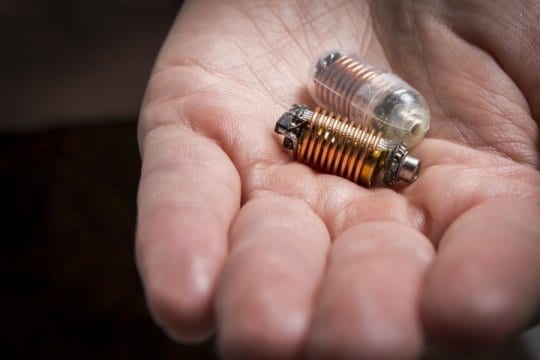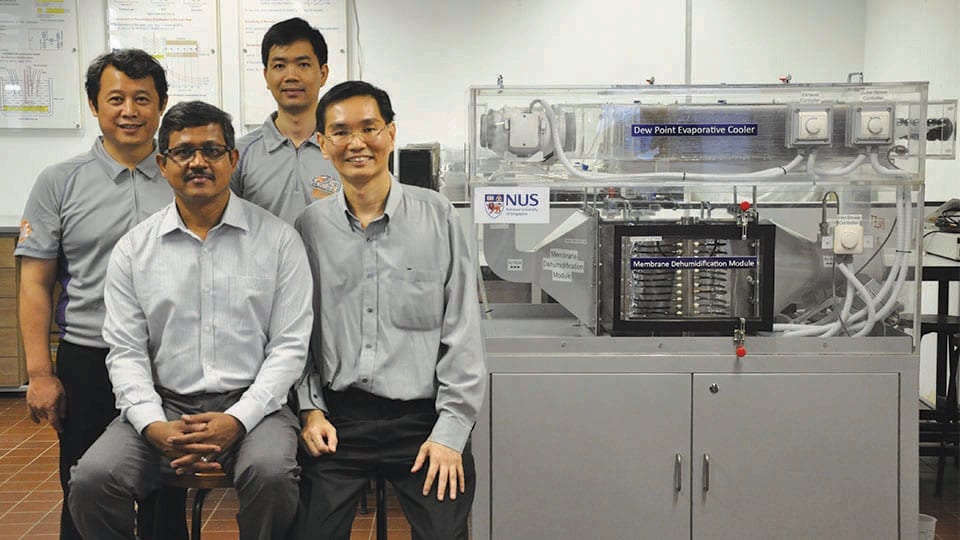
The trials by researchers at RMIT University have uncovered mechanisms in the human body that have never been seen before, including a potentially new immune system.
The new technology and discoveries offer a game-changer for the one-in-five people worldwide who will suffer from a gastrointestinal disorder in their lifetime. They could also lead to fewer invasive procedures like colonoscopies.
The ingestible capsule (the size of a vitamin pill) detects and measures gut gases – hydrogen, carbon dioxides and oxygen – in real time. This data can be sent to a mobile phone.
Professor Kourosh Kalantar-zadeh, study lead and capsule co-inventor, said the trials showed that the human stomach uses an oxidiser to fight foreign bodies in the gut.
“We found that the stomach releases oxidising chemicals to break down and beat foreign compounds that are staying in the stomach for longer than usual,” Kalantar-zadeh said.
“This could represent a gastric protection system against foreign bodies. Such an immune mechanism has never been reported before.”
Another never before seen observation from the trial was that the colon may contain oxygen.
“Trials showed the presence of high concentrations of oxygen in the colon under an extremely high-fibre diet,” Kalantar-zadeh said. “This contradicts the old belief that the colon is always oxygen free.
“This new information could help us better understand how debilitating diseases like colon cancer occur.”
The trials were conducted on seven healthy individuals on low- and high-fibre diets. Results showed that the capsule accurately shows the onset of food fermentation, highlighting their potential to clinically monitor digestion and normal gut health.
The trials also demonstrated that the capsule could offer a much more effective way of measuring microbiome activities in the stomach, a critical way of determining gut health.
“Previously, we have had to rely on faecal samples or surgery to sample and analyse microbes in the gut,” Kalantar-zadeh said.
“But this meant measuring them when they are not a true reflection of the gut microbiota at that time. Our capsule will offer a non-invasive method to measure microbiome activity.”
This could represent a gastric protection system against foreign bodies. Such an immune mechanism has never been reported before.
Now that the capsule has successfully passed human trials, the research team is seeking to commercialise the technology.
Co-inventor Dr Kyle Berean said: “The trials show that the capsules are perfectly safe, with no retention.
“Our ingestible sensors offer a potential diagnostic tool for many disorders of the gut from food nutrient malabsorption to colon cancer. It is good news that a less invasive procedure will now be an option for so many people in the future.
“We have partnered with Planet Innovation to establish a company called Atmo Biosciences and bring the product to market.
“This will lead to Phase II human trials, and help raise the funds needed place this safe and revolutionary gut monitoring and diagnostic device into the hands of patients and medical professionals.”
Learn more: Swallowable sensors reveal mysteries of human gut health
The Latest on: Swallowable sensors
[google_news title=”” keyword=”swallowable sensors” num_posts=”10″ blurb_length=”0″ show_thumb=”left”]- Swallowable sensor unfurls in stomach to monitor gut healthon May 6, 2024 at 2:00 am
A ribbon of electrodes could nestle in the gut to help diagnose gastrointestinal diseases linked to Parkinson’s ...
- Sensors Bolster Army Prowesson May 2, 2024 at 5:00 pm
The Terrain Commander from Textron Corporation provides the basis for the U.S. Army's unattended ground sensor (UGS) Future Combat Systems. The sensor assembly is equipped with a variety of optical, ...
- Massachusetts to deploy hundreds of small community air pollution sensors this yearon April 23, 2024 at 9:44 am
Massachusetts will spend $775,000 to deploy more than 200 small community air sensors across the state, as well as nearly 100 more sophisticated sensors in low-income areas and communities of color.
- Capsule fitted with sensors developed as alternative to endoscopyon March 19, 2024 at 5:00 pm
A capsule fitted with sensors providing an alternative to an endoscopy has been developed to track invisible problems within the intestines. The swallowable capsule measures 3cm long and 1cm wide ...
- Sensors & Diagnosticson October 16, 2023 at 4:46 am
Our initial APC waiver will come to an end at the end of June 2024. Article processing charges will apply to all articles submitted to Sensors & Diagnostics from 1 July 2024 onwards provided that, ...
- The Bizarre New Game You Play By Swallowing A Sensoron November 21, 2018 at 6:37 am
Wearables are already here to monitor your heart rate, breathing, and steps, but pretty soon your doctor might ask you to swallow a device to monitor what’s going on inside your body ...
- MAP Sensoron April 9, 2015 at 4:15 am
The manifold absolute pressure sensor reads the amount of pressure or vacuum (also called “engine load”) in the intake manifold, where outside air is divvied up in proper amounts and ...
- Making Flex Sensors On The Cheapon June 4, 2012 at 3:22 am
When [Michelle] was making a sign language translation glove, she needed a bunch of flex sensors. These flex sensors cost about $10 a pop, meaning her budget for the project was eaten up by these ...
via Google News and Bing News










